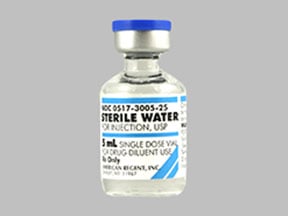
Sterile Water For Injection Coupons & Savings Card – Discount Prices from $119.19
Sterile Water for Injection is a purified, sterile, and nonpyrogenic water preparation devoid of any antimicrobial agents or added buffers, intended exclusively for dissolving or diluting medications prior to administration. It is supplied in single-dose containers to ensure sterility and prevent contamination. Before intravenous use, it is essential to add an appropriate solute to make the solution approximately isotonic, as administering sterile water alone can lead to hemolysis, the destruction of red blood cells. This product is designed solely for parenteral use after the addition of drugs that require dilution or dissolution in an aqueous vehicle prior to injection.
Our coupons are free to use. Before paying, show the pharmacist your Sterile Water For Injection savings card to get your free discount. Use our filters below to edit the prescription box to match your needs. The Sterile Water For Injection prices will update based on your prescription needs. Above our Sterile Water For Injection coupons, you can change your location to see pharmacy prices and costs in other areas. We're here to help you buy Sterile Water For Injection at the lowest price with our prescription discount card.
My prescription
Edit
1000ML, Sterile Water For Injection (1 Flex Cont)
Select pharmacy

CVS
$150.60
COUPON PRICE
Walgreens
$119.19
COUPON PRICE
Albertsons
$119.19
COUPON PRICE
Walmart
$126.01
COUPON PRICESterile Water For Injection savings card
Show this card to your pharmacist
Walgreens
$119.19
BIN
ID
PCN
GRP
011867
LH484DF398
HT
LABH001
Powered by
Sterile Water for Injection is a purified, sterile, and nonpyrogenic water preparation devoid of any antimicrobial agents or added buffers, intended exclusively for dissolving or diluting medications prior to administration. It is supplied in single-dose containers to ensure sterility and prevent contamination. Before intravenous use, it is essential to add an appropriate solute to make the solution approximately isotonic, as administering sterile water alone can lead to hemolysis, the destruction of red blood cells. This product is designed solely for parenteral use after the addition of drugs that require dilution or dissolution in an aqueous vehicle prior to injection.
Our coupons are free to use. Before paying, show the pharmacist your Sterile Water For Injection savings card to get your free discount. Use our filters below to edit the prescription box to match your needs. The Sterile Water For Injection prices will update based on your prescription needs. Above our Sterile Water For Injection coupons, you can change your location to see pharmacy prices and costs in other areas. We're here to help you buy Sterile Water For Injection at the lowest price with our prescription discount card.
Sterile Water For Injection dosage forms
Use our Sterile Water For Injection 10ML coupon with prices from $1.01 for 1 Vial. You can also use our Sterile Water For Injection 10ML coupon with prices from $1.01 for 2 Vials. We have a Sterile Water For Injection 10ML coupon with prices from $1.01 for 3 Vials.
Dosage Quantity Price from Per unit 10ML 1 Vial $1.01 $1.01 10ML 2 Vials $1.01 $0.51 10ML 3 Vials $1.01 $0.34
| Dosage | Quantity | Price from | Per unit |
|---|---|---|---|
| 10ML | 1 Vial | $1.01 | $1.01 |
| 10ML | 2 Vials | $1.01 | $0.51 |
| 10ML | 3 Vials | $1.01 | $0.34 |
